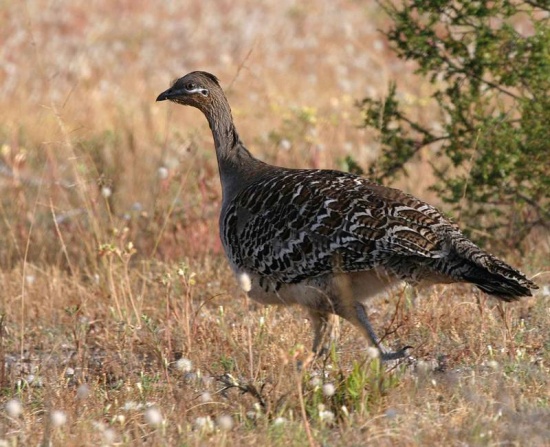Nomdeploom (talk | contribs) |
|||
| Line 1: | Line 1: | ||
| − | + | '''Alternative name:''' Lowan, Malleehen | |
;[[:Category:Leipoa|Leipoa]] ocellata | ;[[:Category:Leipoa|Leipoa]] ocellata | ||
[[Image:Malleefowl.jpg|thumb|550px|right|Photo by Pearly shells]] | [[Image:Malleefowl.jpg|thumb|550px|right|Photo by Pearly shells]] | ||
==Identification== | ==Identification== | ||
| + | 55-61cm | ||
| + | *Quite Large | ||
| + | *Grey Head, Neck | ||
| + | *Black line down Neck | ||
| + | *Upper-parts mottled Grey, White, Black, Chestnut and Buff | ||
==Distribution== | ==Distribution== | ||
| − | + | Patchy though the Mallee areas of s. NSW, nw. Vic and Little Desert to Murry river Basin. Small patches of population in mallee areas of SA and sw. NT | |
==Taxonomy== | ==Taxonomy== | ||
This is a monotypic species<sup>[[#References|[1]]]</sup>. | This is a monotypic species<sup>[[#References|[1]]]</sup>. | ||
==Habitat== | ==Habitat== | ||
| − | + | Unburnt mallee or woodland with lots of leaf litter and low scrub | |
==Behaviour== | ==Behaviour== | ||
| + | *Moves around in Singles or Pairs | ||
| + | *Forages in Scrub and Grain Stubbles | ||
| + | *When wary 'Freezes', then slowly moves away, or flys up tree, with heavy flapping | ||
| + | *Dust-bathes, Rests and Basks in Deep Shade | ||
| + | *Roosts on low Branch | ||
| + | *Forages in leaf litter | ||
| + | ===Breeding=== | ||
The male makes the nest by scraping a large depression in sandy soil. He fills it with sticks, leaves and bark, maing a mound. He mixes the material to decay it and then digs an egg chamber. He adds more soil to the mound once the eggs have been laid. Usually 15 eggs are laid at weekly intervals. Incubation takes between 50 and 100 days dependent on temperature. Chicks hatch one at a time and scratch their way to the surface of the mound. They are independent from the start. | The male makes the nest by scraping a large depression in sandy soil. He fills it with sticks, leaves and bark, maing a mound. He mixes the material to decay it and then digs an egg chamber. He adds more soil to the mound once the eggs have been laid. Usually 15 eggs are laid at weekly intervals. Incubation takes between 50 and 100 days dependent on temperature. Chicks hatch one at a time and scratch their way to the surface of the mound. They are independent from the start. | ||
| + | ===Voice=== | ||
| + | The male emitts two deep, bellowing notes or booms with the female speaking in high pitched crows, soft crooning and low grunts. | ||
==References== | ==References== | ||
# Clements, James F. 2007. ''The Clements Checklist of Birds of the World''. 6th ed., with updates to October 2007. Ithaca: Cornell University Press. ISBN 9780801445019 | # Clements, James F. 2007. ''The Clements Checklist of Birds of the World''. 6th ed., with updates to October 2007. Ithaca: Cornell University Press. ISBN 9780801445019 | ||
Revision as of 09:37, 22 January 2010
Alternative name: Lowan, Malleehen
- Leipoa ocellata
Identification
55-61cm
- Quite Large
- Grey Head, Neck
- Black line down Neck
- Upper-parts mottled Grey, White, Black, Chestnut and Buff
Distribution
Patchy though the Mallee areas of s. NSW, nw. Vic and Little Desert to Murry river Basin. Small patches of population in mallee areas of SA and sw. NT
Taxonomy
This is a monotypic species[1].
Habitat
Unburnt mallee or woodland with lots of leaf litter and low scrub
Behaviour
- Moves around in Singles or Pairs
- Forages in Scrub and Grain Stubbles
- When wary 'Freezes', then slowly moves away, or flys up tree, with heavy flapping
- Dust-bathes, Rests and Basks in Deep Shade
- Roosts on low Branch
- Forages in leaf litter
Breeding
The male makes the nest by scraping a large depression in sandy soil. He fills it with sticks, leaves and bark, maing a mound. He mixes the material to decay it and then digs an egg chamber. He adds more soil to the mound once the eggs have been laid. Usually 15 eggs are laid at weekly intervals. Incubation takes between 50 and 100 days dependent on temperature. Chicks hatch one at a time and scratch their way to the surface of the mound. They are independent from the start.
Voice
The male emitts two deep, bellowing notes or booms with the female speaking in high pitched crows, soft crooning and low grunts.
References
- Clements, James F. 2007. The Clements Checklist of Birds of the World. 6th ed., with updates to October 2007. Ithaca: Cornell University Press. ISBN 9780801445019
- Pizzey, G. & Knight, F. 1997. Birds of Australia (Collins Field Guide). HarperCollins Publishers, London. ISBN 0-00-220132-1




